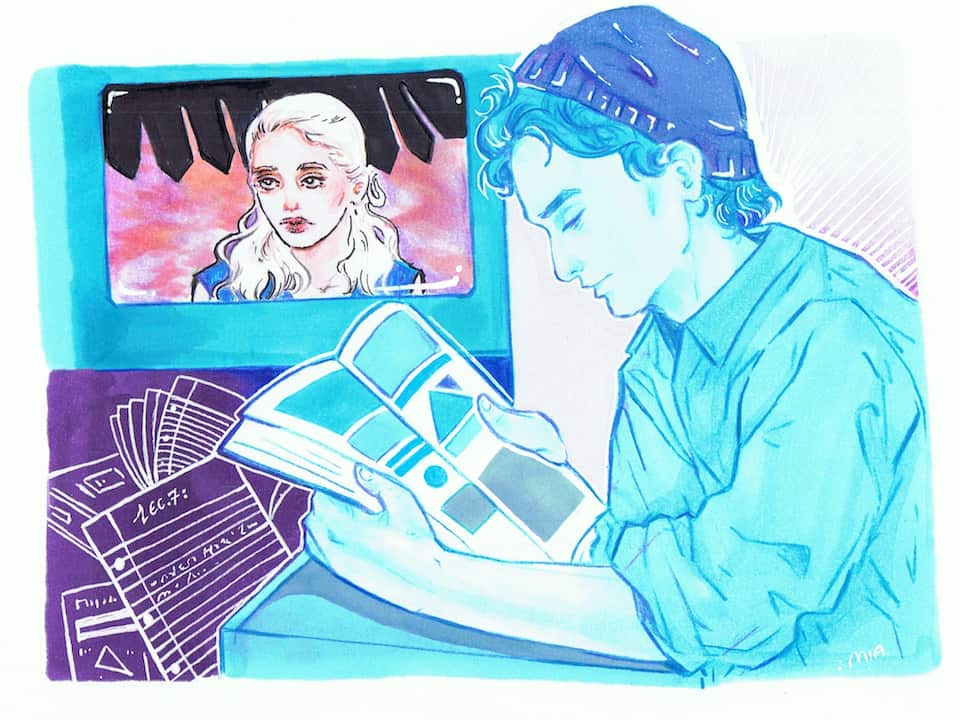[dropcap]A[/dropcap]t some point in your Internet travels, you’ve likely stumbled upon a picture of a project management triangle, or at least a variant of it.
In this image, you are presented with a triangle containing the words ‘good grades,’ ‘social life,’ and ‘enough sleep,’ written near each of the triangle’s three corners. You, a university student, are asked to ‘pick two,’ suggesting that if you want good grades and a social life, prepare to suffer some sleepless nights; but if you want to party and also get enough shuteye, you best be willing to watch your GPA plummet like a thermostat.
The problem with this triangle is that, well, it’s a triangle. It only presents you with three choices. In reality, the life of a U of T undergrad is far more complex than three angles and 180 degrees can handle. What is omitted from this ‘pick two’ test is what is essentially the cornerstone of every university student’s diet: consumption of media. It’s a no-brainer, really — find me a student who doesn’t binge-watch TV, scarf down movies, pig out on music, or devour books for leisure, and I’ll eat my hat.
The biggest difficulty with media consumption is that there’s a lot to consume. Gone are the days of three channels, or movies that only ran once in theatres before disappearing forever. There’s an infinite amount of content out there, and new media is popping up all the time. All this backlogged content can and will pile up, and chipping away at it can be as laborious as schoolwork. In a way, media consumption is almost like academic consumption, in that students struggle to keep up with both. You’ll always be behind on your readings, just as you’ll always be behind on House of Cards and Jonathan Franzen’s bibliography.
Although some people laugh at me when I complain about my multimedia backlog, it’s as serious as a heart attack or an HBO drama. Netflix releases at least two ‘must-see’ series’ every month, but I’m still trying to get through my DVD’s of Battlestar Galactica, which concluded in 2009. I’ve already given up hope on my bookshelf, which is so heavy with unread literature that it’s starting to sink. The only album of note I listened to last year was Kendrick Lamar’s To Pimp a Butterfly — Grimes’ Art Angels and Jamie xx’s In Colour remains untouched. I’m very behind.
Media consumption is so much more than a mere distraction, and so much more than simple procrastination. It’s almost like a job, or some sixth course that doesn’t show up on your timetable. Because of the importance of certain works of art within the cultural zeitgeist, keeping up is crucial if you want to be taken seriously by your peers, or if you want to be able to talk about Empire without making a fool of yourself. By consuming media, you are, in a way, getting something done. It doesn’t matter if you’re reading a new book, watching a new superhero series, or seeing a new Tarantino flick; you’re chipping away at that great mountain of art, improving your fluency in all things pop culture, and consuming piles of media before they consume you.
But let’s not forget that while demolishing media may sometimes be a chore, it’s primarily enjoyable, and can serve as a remedial antidote to the metaphorical poison of academia. Without a show to watch and ‘tune out’ to, or without a favourite album to calm your nerves, this metaphorical poison can start to wear you down, free to corrupt you from the inside out. Making time to consume media is not a luxury — rather, it’s a necessity.
This brings me back to the project triangle. For students, media consumption is a difficult variable to balance with other responsibilities. For some, it is a top priority, with ‘achieving pop culture omniscience’ nestled somewhere above ‘good grades’ and ‘enough sleep.’ For others, it is completely neglected. For most, it’s a harbinger of moral conflict.
Some students may feel guilty when they watch a show when they should be doing a reading instead. You need not feel this guilt, for all media consumption is an accomplishment: in watching a show or listening to an album, you’ve done something for yourself — either for your own pure enjoyment or for your continual survival in a media-crazed 21st century.
What’s essential is that you find a balance — one that allows you to stay up-to-date on pop culture and classwork, and allows you to enjoy the media you consume without feeling overwhelmed by it, find a balance that doesn’t jeopardize your GPA, your ‘me’ time, your ‘friends’ time, or your sleep cycle.
Whatever you do, don’t feel obliged to ‘pick two.’ Like an acclaimed miniseries or a Kendrick Lamar concept album, it’s so much more complicated than that.


